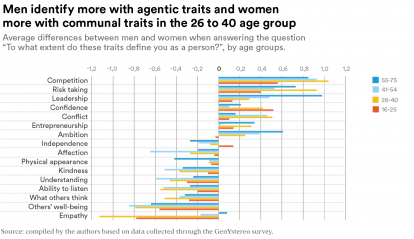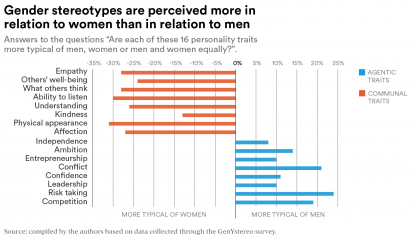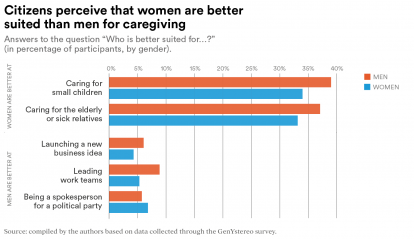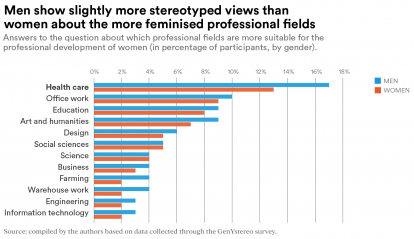
Competitive men and empathetic women: gender
stereotypes persist among millennials
14.11.24
6 minutes readThe study ¿Are gender stereotypes still alive in the twenty-first century?, by the Social Observatory of the ”la Caixa” Foundation, has analysed the current relevance of these stereotypes. The research, led by Marta Fraile from the Institute of Public Goods and Policies (CSIC), and Paula Zuluaga, from the Department of Political Science at the Universitat Autònoma de Barcelona (UAB), was based on an online survey of 5,000 people.
Gender stereotypes are preconceived ideas that, consciously or unconsciously, are held about the characteristics, behaviours and roles that men and women exhibit in society. Social role theory suggests that these stereotypes are precisely the result of the different roles men and women have traditionally occupied.
These ideas portray women as understanding, empathetic, conciliatory and caring (known as “communal” traits), while men emerge as enterprising, competitive, confident and possessing leadership skills (known as “agentic” attributes).

Based on this idea, the study published by the Social Observatory of the ”la Caixa” Foundation, ¿Are gender stereotypes still alive in the twenty-first century?, has analysed the current relevance of these stereotypes and concluded that they persist, especially among the millennial generation, as demonstrated by the attribution of personality traits to men and women by those taking part in the study. The research, based on the responses of an online survey of 5,012 participants aged 16 to 75, analyses the perception of these stereotypes by age group.
“In our study, what we see is that younger people tend to have less stereotyped views. In contrast, the older generations, especially millennials, and of course those over 41 – Generation X and the boomer generation – are the groups that present more stereotyped views of society,” highlighted Marta Fraile, co-author of the study, senior researcher and Vice director of the Institute of Public Goods and Policies (CSIC).
Asked about the traits that define them as a person, the results show that men aged 55 to 75, belonging to the baby-boomer generation, identify more strongly than women with such traits as leadership, followed by competition and risk-taking.
Respondents aged 41 to 54 (Generation X) choose competition, risk-taking and leadership, while men aged 26 to 40 (millennials) also identify more strongly than women of their age group with traits like competition and risk-taking, as well as conflict. Finally, young people in the 16 to 25 age group (Generation Z) identify with competition and self-confidence more than women of their age group.
Among women, participants aged between 55 and 75 identify with such traits as affection, concern for the well-being of others and the importance of physical appearance more than men. Women belonging to Generation X (aged 41 to 54) also identify more than men with concern for others’ well-being, followed by affection, while those aged 26 to 40 (millennial generation) particularly identify with empathy, followed by concern for the well-being of others as attributes that define them to a greater extent.
Finally, the youngest group (16 to 25 year-olds) emphasise empathy and the well-being of others. They are also the only group to identify more than men of their age with the trait of independence, as can be seen in the following graph:

“Although it may seem old-fashioned, the evidence collected confirms that in the 21st century, men continue to identify to a greater extent with traits traditionally associated with the idea of masculinity, especially competition, risk-taking and leadership, with the sole exception of independence. In contrast, women continue to identify with more typically feminine attributes, especially empathy and concern for the well-being of others,” highlighted Marta Fraile.
Stereotypes more associated with
women
In addition to personal identification with the list of more typically masculine and feminine qualities, the study has analysed the extent to which participants continue to perceive women and men based on qualities related to the development of personal fulfilment and leadership (traditionally associated with the idea of masculinity) or attributes oriented towards the consideration of other people’s well-being (typically associated with the idea of femininity).
The more than 5,000 people who took part in the study revealed that gender stereotypes are perceived to a greater extent about women. This is shown in the following graph, which confirms that the percentage of respondents reflecting a traditional view of typically feminine traits in society is higher than that for masculine traits. For example, up to 30% of all participants state that listening to others and caring about their image are typical traits of women. In contrast, among all the traits perceived as typically masculine, only one of them, the willingness to take risks, reaches a significant percentage of 24%:

“Our study shows that a significant percentage of people in Spain still believe that women are “from Venus” and men are “from Mars”, since they have very different attributes, expectations and needs,” Fraile pointed out.
Family
caregiving, feminised roles
The article also concludes that family caregiving continues to be perceived as a strongly feminised role. Specifically, 39% of men and 34% of women believe that women are better suited to care for children; likewise, 37% of men and 33% of women believe that they are more qualified to care for the elderly or sick relatives, as can be seen in the following graph:

On the other hand, the attribution of roles traditionally associated with men is quite low. Thus, 6% of men and 7% of women believe that men are better suited to be spokespersons for a political party; 9% of men and 5% of women consider men to be better prepared to lead work teams. Lastly, 6% of men and 4% of women respond that men are more competent to launch a new business idea.
Gender stereotypes and professional
fields
The researchers also asked respondents to decide, from a total of 12 professional fields, which they considered to be more suited to men, women, or both. The following graph shows the percentage of responses indicating that each of the 12 fields is more suitable for women.
The results are ambivalent, as those who consider professional fields to be more suitable for women never exceed 15% of the total number of participants. However, the higher percentages are concentrated precisely in the most feminised sectors such as health care, teaching, art or office work.
In terms of gender differences, men tend to hold more stereotyped views than women, especially in the care-associated and healthcare sector, and show statistically significant differences compared to women, as shown in the graph below:

“Although traditional ideas that associate leadership skills with masculinity seem to be declining among younger generations, men are still associated to a greater extent than women with entrepreneurial roles. But perhaps the clearest result is the linkage of women with care-associated tasks. Lastly, gender stereotypes persist in the professional context, especially in more feminised sectors, such as health care or education,” concludes the co-author.






